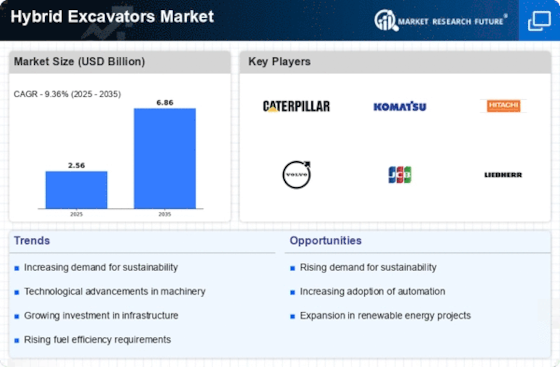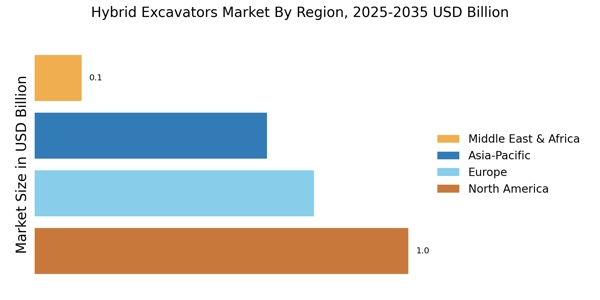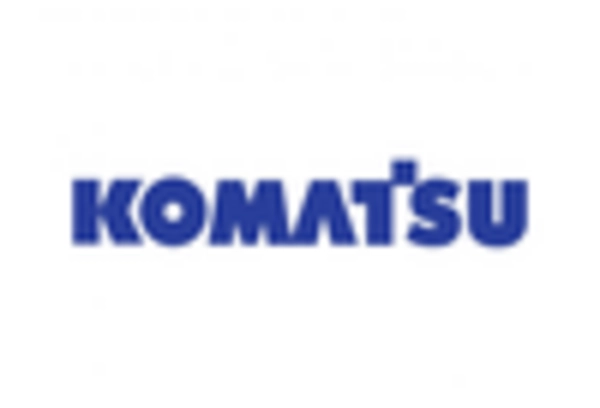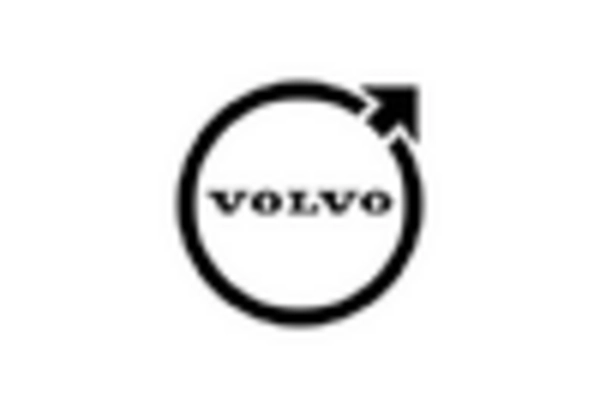Government Incentives and Regulations
Government policies and regulations are significantly influencing the Hybrid Excavators Market. Many countries are implementing stricter emissions standards and offering incentives for the adoption of cleaner technologies. These regulations encourage construction companies to transition from conventional machinery to hybrid alternatives. For example, tax rebates and grants for purchasing hybrid equipment can offset initial investment costs, making it more attractive for businesses. As regulatory frameworks continue to evolve, the Hybrid Excavators Market is expected to benefit from increased adoption rates, as companies strive to comply with environmental standards while maintaining competitiveness.
Cost Savings and Operational Efficiency
Cost efficiency remains a pivotal factor in the Hybrid Excavators Market. Hybrid excavators are designed to reduce fuel consumption and maintenance costs, which can lead to substantial savings for construction companies. By utilizing electric power during certain operations, these machines can operate at lower costs compared to traditional excavators. Furthermore, the longevity of hybrid systems often results in reduced downtime and maintenance expenses. As companies seek to optimize their operational budgets, the financial advantages of hybrid excavators become increasingly appealing. This trend is expected to drive further investment in the Hybrid Excavators Market, as businesses aim to enhance their profitability.
Rising Demand for Sustainable Construction
The Hybrid Excavators Market is experiencing a notable increase in demand for sustainable construction practices. As environmental concerns gain prominence, construction companies are increasingly seeking equipment that minimizes carbon emissions and fuel consumption. Hybrid excavators, which combine traditional diesel engines with electric power, offer a compelling solution. According to recent data, the adoption of hybrid technology in construction machinery is projected to grow at a compound annual growth rate of approximately 10% over the next five years. This shift towards sustainability not only aligns with regulatory pressures but also appeals to environmentally conscious clients, thereby driving the Hybrid Excavators Market forward.
Technological Innovations in Hybrid Systems
Technological advancements play a crucial role in shaping the Hybrid Excavators Market. Innovations in battery technology, energy management systems, and hybrid powertrains are enhancing the efficiency and performance of hybrid excavators. For instance, the integration of advanced sensors and IoT capabilities allows for real-time monitoring and optimization of energy usage. This not only improves operational efficiency but also reduces downtime. As manufacturers continue to invest in research and development, the market is likely to witness the introduction of more sophisticated hybrid models, further propelling the Hybrid Excavators Market. The potential for increased productivity and reduced operational costs makes these innovations particularly appealing to construction firms.
Growing Urbanization and Infrastructure Development
The ongoing trend of urbanization and infrastructure development is a key driver for the Hybrid Excavators Market. As urban areas expand, the demand for efficient construction equipment rises. Hybrid excavators, known for their versatility and reduced environmental impact, are becoming increasingly favored in urban construction projects. The need for infrastructure improvements, such as roads, bridges, and public transport systems, further fuels this demand. Market analysis indicates that the construction sector is projected to grow by approximately 5% annually, which will likely enhance the adoption of hybrid technologies in excavators, thereby benefiting the Hybrid Excavators Market.

















